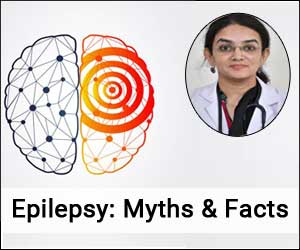- Home
- Editorial
- News
- Practice Guidelines
- Anesthesiology Guidelines
- Cancer Guidelines
- Cardiac Sciences Guidelines
- Critical Care Guidelines
- Dentistry Guidelines
- Dermatology Guidelines
- Diabetes and Endo Guidelines
- Diagnostics Guidelines
- ENT Guidelines
- Featured Practice Guidelines
- Gastroenterology Guidelines
- Geriatrics Guidelines
- Medicine Guidelines
- Nephrology Guidelines
- Neurosciences Guidelines
- Obs and Gynae Guidelines
- Ophthalmology Guidelines
- Orthopaedics Guidelines
- Paediatrics Guidelines
- Psychiatry Guidelines
- Pulmonology Guidelines
- Radiology Guidelines
- Surgery Guidelines
- Urology Guidelines
EPILEPSY: Know the myths and facts about seizures- Dr Rima Chaudhari

Epilepsy is a condition with recurrent seizures (two or more) which are not provoked by systemic or acute neurologic insults. Epilepsy is fairly common, with an incidence of 45 per lac per year and a cumulative lifetime incidence of 3% worldwide. India shares a substantial proportion of the global health burden with approximately 10 -20 % of the globally afflicted population residing here. There is a huge treatment gap in Epilepsy, despite the significant advances in the medical and surgical aspects of the illness. What we also don’t understand scares us, and that is why separating the myths from the truths is vital. Here are the common myths about seizures, and why they are just– myths.
MYTH: EVERYTHING THAT SHAKES OR MOVES MEANS EPILEPSY
Fact: Not everything that creates transient movements is Epilepsy. I often encounter individuals where there have been abnormal movements which are transient, and patients have been wrongly put on anti-seizure medications for the same. There are a host of other conditions such as movement disorders, Tremors, Chorea, which need to be seen by the neurologist and treated accordingly.
MYTH: ONE WILL ALWAYS HAVE SHAKING LIMB AS A PART OF THE SEIZURE
Fact: Not every part of the seizure will have limb shaking. A seizure has several phenomena which include a Prodrome or an aura which the patient perceives. Then there are the Dyscognitive Seizures, which may never produce any limb movement. All that happens is that the person is in a dreamy state or is conscious but unresponsive. It is very important for the caregiver to be aware of these phenomena as well and report it to their doctor.
MYTH: IF ONE DID NOT HAVE A SEIZURE RECURRENCE FOR FEW DAYS, IS IT OK TO STOP THE MEDICATION?
Fact: Stopping a seizure medication is the decision of the treating Neurologist or an Epileptologist. It has to be done gradually and over a period of time. Abrupt stoppage of seizure medications is not advisable and can lead to breakthrough seizures or a status epilepticus (continuous seizures, which can produce coma-like state).
MYTH: THERE IS NO CURE FOR EPILEPSY WHICH HAS BEEN ONGOING FOR YEARS AND TREATED WITH MULTIPLE MEDICATIONS
Fact: There are definitely other modalities for treatment for these patients. However, they have to be screened carefully, by a trained team for any surgical treatment to be offered. Certain type of Epilepsy Syndromes (Mesial Temporal Sclerosis, Cortical Dysplasia, etc.) can be treated surgically, following which there is a hope of remission.
MYTH: ONE CANNOT LEAD A NORMAL LIFE WITH EPILEPSY
Fact: Yes, you can always lead a normal life with Epilepsy. Epilepsy is just a medical condition which needs special medical care. This involves drug treatment and goals of patient safety. There are many patients who have had a successful family life and career as well.
SOME COMMON DOS AND DON’TS WITH SEIZURES, WHICH ARE KNOWN BUT OFTEN TIMES FORGOTTEN.
- Report any change in your seizure frequency to your doctor
- Try and sleep adequately, at least 8 hrs every night
- Avoid shift duties or late work hours
- Please be compliant with your medication, which means taking your meds regularly
- Always carry your ‘rescue medication’, which your Neurologist may have prescribed you take in case of a big seizure
- Avoid driving; you will be harming not only yourself but your loved ones too
- Avoid alcohol consumption
Lastly, try and lead a healthy life, eat healthy meals, exercise, do meditation; after all, Epilepsy is just a part of life
Dr Rima Chaudhari is a consultant neurologist at Fortis Hospital, Mulund

Disclaimer: This site is primarily intended for healthcare professionals. Any content/information on this website does not replace the advice of medical and/or health professionals and should not be construed as medical/diagnostic advice/endorsement or prescription. Use of this site is subject to our terms of use, privacy policy, advertisement policy. © 2020 Minerva Medical Treatment Pvt Ltd